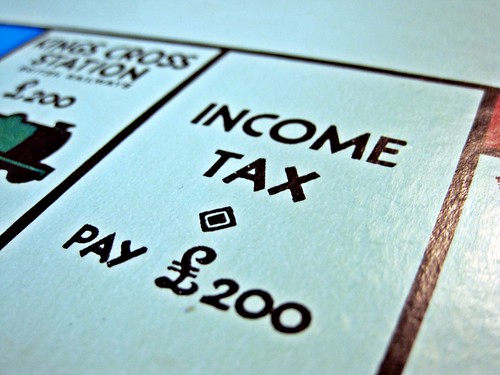I see a lot of internet questions about flat taxes and progressive taxes. It seemed that since I do a tax blog, it was time to tackle those basic questions.
A flat tax is a tax that is the same for everyone, under all circumstances. A good example of a flat tax is the sales tax rate. It doesn’t matter whether you are rich or poor; everyone pays the same sales tax percentage. Some cities have a flat income tax. For example: The City of St Louis, Missouri has a 1% income tax on wages of people who live or work within the city limits. It doesn’t matter whether you make $15,000 a year or $150,000 a year; you still pay the 1% city tax.
A progressive tax increases as your income goes up. This is what our current federal tax code is like. For a single person, the first $9,750 isn’t even taxed. Then the next $8,700 is taxed at 10%, the next $26,650 is taxed at 15%, the next $50,300 at 25%, the next 93,300 at 28%, the next $209,699 at 33% and anything over $388,351 is taxed at 35%.
Those rates change if you’re married or filing as head of household. I’m not going to post all the tax rates here. If you want to look, check out the tax rate tables at the IRS website: http://www.irs.gov/pub/irs-pdf/i1040tt.pdf The tax rates are all listed on page 14.
Tax Incentives are tax rules that are intended to influence behavior. Things like the mortgage interest deduction which is designed to help people buy homes, or the charitable donation deduction which is designed to get people to donate to charity are examples of what would be considered tax incentives.
There’s been a lot of talk about changing the tax code. Right now, we have a progressive tax code with lots of tax incentives. Major changes to the tax code will be difficult to pass; there are many lobbyists and interest groups that all have their own agendas. There will be lots of pressure on our representatives to keep the tax loopholes. The whole concept of changing the code is so controversial that the Senate Finance Committee leaders have offered to keep Senator’s ideas secret for 50 years. http://www.businessweek.com/articles/2013-07-25/congress-will-keep-senators-tax-reform-wishes-secret-for-50-years
The tax code has nearly doubled in length over the past two years. If I had any say in the voting, I’d like to see the tax code made easier. Yes, a difficult tax code keeps me employed, but I can live with the consequences. I think a simplified tax code is good for the country.
What changes would you make? What deductions do we really need, if any? What needs to go? Post your answers, I’m curious. Your post won’t show up immediately. My site has a delay to screen for spam. You wouldn’t believe what kind of weird comments there’d be without it. But if you make a post, it will show up within a day or two. Thanks.
Update: I posted this blog on Tuesday morning, August 6. Tuesday evening I saw this segment on The Daily Show. I’m pretty sure that John Oliver doesn’t read my blog, but he’s at least on the same wave length. http://www.thedailyshow.com/watch/tue-august-6-2013/don-t-mess-with-taxes


One thought on “What is a Progressive Tax? What is a Flat Tax?”